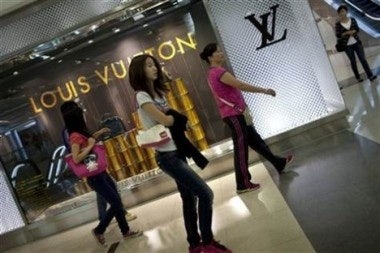Ultra-Wealthy & "Increasingly Sophisticated And Well-Educated" Middle Class Expected To Sustain Sales#

Despite ongoing concerns like Europe's debt crisis and the temporary but noticeable drop in Japanese spending following this spring's earthquake and tsunami, the global luxury industry's broader outlook remains bullish on the strength of M&A activity and demand from China's seemingly insatiable luxury consumers. While China continues to mull over a reduction to its high luxury tax in an attempt to boost domestic spending, create jobs, and put a (partial) lid on the billions spent on luxury goods by mainland Chinese outside the country's borders, Chinese shoppers continue to buoy sales not only at home or in Hong Kong, but also -- and perhaps more importantly -- in New York, London and Paris.
This week, Reuters spoke to Laurent Belloni, manager of the Pictet Premium Brands fund (which manages assets worth nearly US$1.4 billion), who shares the optimism about China recently seen among other observers of the global luxury market. As Belloni put it, due to the country's growing number of millionaires and billionaires, and the emergence of an "increasingly sophisticated and well-educated" middle class, "the potential of China remains huge".
Still, Belloni's views aren't that surprising, as the top holdings of his fund include brands that are currently undergoing massive expansion in the China market: LVMH, Richemont, Tiffany, Burberry, Swatch, Polo Ralph Lauren, Estee Lauder, Starwood Hotels, Christian Dior and BMW.
While optimism about the Chinese luxury market is widespread within the luxury industry, owing mostly to its relative underdevelopment and the massive potential of second- and third-tier cities, serious growing pains are evident and will need to be addressed in time. As Torsten Stocker, of the global strategy consulting firm the Monitor Group, told Jing Daily, key issues currently becoming apparent in mainland China's luxury market include "recruiting, training and keeping sales and service employees". As Stocker noted, although this is a problem across almost all business sectors in China, it's "particularly difficult in luxury, where large income and lifestyle inequalities mean that sales staff inhabit a very different world from their customers, in a way that is much more pronounced than in Europe or the US." As Jing Daily wrote last December, uneven customer service and staff training continue to plague major brands as they expand into inland China, turning off many potential customers and enticing them to shop in places like Hong Kong, where service standards are of a more global level.
However, Stocker pointed out that new opportunities and business models continue to appear in China's "luxury eco-system", from after-care and repair services to wine storage, driver training and yacht interior design and maintenance.